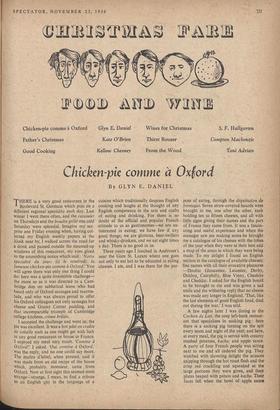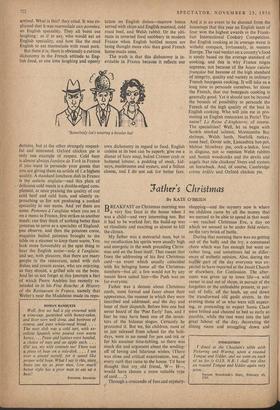2 a SOOL ,arD
Chicken-pie comme a Oxford
Glyn E. Daniel
Wines for Christmas
S. F. Hallgarten
Father's Christmas
Kate O'Brien
Thirst Rouser Compton Mackenzie Good Cooking Kellow Chesney From the Wood Toni Adrian
Chicken-pie comme a Oxford
By GLYN E. DANIEL
THERE is a very good restaurant in the
Boulevard St. Germain which puts on a different regional speciality each day. Last winter I went there often, and the cassoulei on Thursdays and the boudin grille one cold Saturday were splendid. Imagine my sur- prise one Friday evening when, having col- lected my English weekly papers at the kiosk near by, I walked across the road for a drink and paused outside the steamed-up windows of this restaurant, my eyes glued to the astonishing notice which said: 'Noire specialize du jour; ici le vendredi; in fameuse chicken-pie comme a Oxford.' You will agree there was only one thing I could do; here was a quite irresistible challenge— the more so as it was directed to a Cam- bridge don on sabbatical leave who had heard only of Oxford sausages and marma- lade, and who was always proud to offer his Oxford colleagues not only sausages but cheese and Grassy Corner pudding, and that incomparable triumph of Cambridge college kitchens, creme bridee.
I accepted the challenge and went in; the pie was excellent. It was a hot pate en crate de volaille such as one might get with luck in any good restaurant or house in France. I enjoyed my meal very much. `Comore Oxford?' I asked. 'Ord, comme it Oxford,' was the reply, and no one could say more. The maitre dhOtel, when pressed, said it Was made from an old recipe of the house which, probably, monsieur, came from Oxford. Now at first sight this seemed most strange—strange, I mean, to find a tribute to an English city in the language of a
cuisine which traditionally despises English cooking and laughs at the thought of any English competence in the arts and crafts of eating and drinking. For there is no doubt of the official and popular French attitude to us as gastronomes—we are un- interested in eating; we have few if any good things; we are gluttons, beer-swillers and whisky-drinkers, and we eat eight times a day. There is no good in us.
Three years ago 1 lunched in Androuet's near the Gare St. Lazare where one goes not only to eat but to be educated in eating cheeses. I ate, and 1 was there for the pur- pose of eating, through the degustation de fromages. Seven straw-covered boards were brought to me, one after the other, each holding ten to fifteen cheeses, and all with little signs giving their names and the part of France they came from. It was a fascin- ating and useful experience and when the manager saw me making notes he brought me a catalogue of his cheeses with the times of the year when they were at their best and a map of the areas in which they were being made. To my delight I found an English section in the catalogue of available cheeses; fine names with all their evocative pleasures —Double Gloucester, Leicester, Derby, Dunlop, Caerphilly, Blue Vinny, Cheshire and Cheddar. I asked for the English board to be brought to me and was given a sad smile and the withering reply that no cheese was made any longer in England. 'That, like the last elements of good English food, died out during the war,' I was told.
A few nights later I was. dining in the Cochon de Lair, the cosy left-bank restaur- ant that specialises in sucking pig : here there is a sucking pig turning on the spit every noon and night of the year, and here, at every meal, the pig is served with creamy mashed potatoes, kacha, and apple sauce. A party of four French people was sitting next to me and all ordered the pig. They watched with slavering delight the scissors snipping through the hot roast flesh and the crisp red crackling and squeaked at the large portions they were given, and their plates heaped with potato and kacha. Their faces fell when the bowl of apple sauce arrived. What is this? they cried. It was ex- plained that it was marmelade aux pommes, an English speciality. They all burst out laughing: as if to say, who would eat an English speciality, and how like the mad English to eat marmalade with roast pork.
But there it is; there is obviously a curious dichotomy in the French attitude to Eng- lish food, at one time laughing and openly
'Somebody isn't wearing a bowler hat'
derisive, but at the other strangely respect- ful and interested. Oxford chicken pie is only one example of respect. Cold ham is almost always Jambon de York in France if you want to persuade your guests that you are giving them an article of t:.e highest quality. A standard luncheon dish in France is the assiette anglaise—and this plate of delicious cold meats is a double-edged com- pliment, at once praising the quality of our cold beef and cold ham, and silently re- proaching us for not producing a cooked speciality to our name. And yet there are some. Pommes a ?anglaise when you see it on a menu in France, first strikes as another insult; can they think of nothing better than potatoes to serve as a speciality of England, you observe, and then the potatoes come, exquisite boiled potatoes brought to the table on a steamer to keep them warm. You look more favourably at the next thing to bear the English name—sole a l'anglaise, and see, with pleasure, that there are many people in the restaurant, sated with rich dishes and cream sauces, who are enjoying, as they should, a grilled sole on the bone. And let us not forget at this juncture a fact of which Pierre Andrieu has recently re- minded us in his Fine Bouche: A History of the Restaurant in France, namely that Weber's near the Madeleine made its repu-
tation on English dishes—marrow bones served with chips and English mustard, cold roast beef, and Welsh rabbit. Or the ulti- mate in inverted food snobbery in modern France when English bottled sauces are being thought more chic than good French home-made ones.
The truth is that this dichotomy is in- evitable in France because it reflects our own dichotomy in regard to food. English cuisine at its best can be superb; give me a dinner of hare soup, baked Cromer crab or buttered lobster, a pudding of steak, kid- neys, mushrooms and oysters, and a Stilton cheese, and I do not ask for better fare.
And it is an event to be shouted from the housetops that this year an English team of four won the highest awards in the Frank- furt International Cookery Competition. But English cooking at its average worst is withdut compare, fortunately, in western Europe. The real verdict on a country's food is surely based on the average standard of cooking, and this is why France reigns supreme, not because of the haute cuisine francaise but because of the high standard of integrity, quality and variety in ordinary French bourgeois cooking. It will take us a long time to persuade ourselves, let alone the French, that our bourgeois cooking is generally good. Yet it should not be beyond the bounds of possibility to persuade the French of the high quality of the best in English cooking. Who will join me in pro- moting an English restaurant in Paris? The name? La Reine d'Angleterre, of course. The specialities? Well, let us begin with Scotch smoked salmon, Morecambe Bay shrimps, Welsh lamb, Norfolk turkey, roast beef, Dover sole, Lancashire hot-pot, Melton Mowbray pie, cock-a-leekie, love in disguise, not to mention Welsh rabbits and Scotch woodcocks and the devils and angels that ride chickens' livers and oysters on horseback. And, of course, Cambridge creme bailee and Oxford chicken pie.











































































 Previous page
Previous page